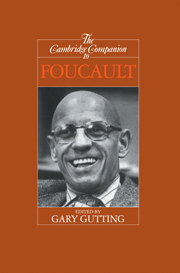Book contents
- Frontmatter
- Introduction: Michel Foucault: A user’s manual
- 1 Foucault’s mapping of history
- 2 Foucault and the history of madness
- 3 The death of man, or exhaustion of the cogito? Translated by Catherine Porter
- 4 Power/Knowledge
- 5 Ethics as ascetics: Foucault, the history of ethics, and ancient thought
- 6 The ethics of Michel Foucault
- 7 “What is enlightenment?”: Kant and Foucault
- 8 Modern and countermodern: Ethos and epoch in Heidegger and Foucault
- 9 Foucault and Habermas on the subject of reason
- 10 “Between tradition and oblivion”: Foucault, the complications of form, the literature of reason, and the aesthetics of existence
- 11 Foucault, feminism, and questions of identity
- 12 Foucault, Michel, 1926–Translated by Catherine Porter
- Bibliography
- Index
1 - Foucault’s mapping of history
Published online by Cambridge University Press: 28 May 2012
- Frontmatter
- Introduction: Michel Foucault: A user’s manual
- 1 Foucault’s mapping of history
- 2 Foucault and the history of madness
- 3 The death of man, or exhaustion of the cogito? Translated by Catherine Porter
- 4 Power/Knowledge
- 5 Ethics as ascetics: Foucault, the history of ethics, and ancient thought
- 6 The ethics of Michel Foucault
- 7 “What is enlightenment?”: Kant and Foucault
- 8 Modern and countermodern: Ethos and epoch in Heidegger and Foucault
- 9 Foucault and Habermas on the subject of reason
- 10 “Between tradition and oblivion”: Foucault, the complications of form, the literature of reason, and the aesthetics of existence
- 11 Foucault, feminism, and questions of identity
- 12 Foucault, Michel, 1926–Translated by Catherine Porter
- Bibliography
- Index
Summary
All of Foucault's major works are histories of a sort, which is enough to make him a historian of a sort. The challenge is to determine what sort of history he does and thus what kind of historian he is. It is fortunate that Foucault has adopted distinctive terms for his specific approaches at different phases of his career. His early works, the ones that earned him his reputation, were called “archaeologies,” the subsequent ones “genealogies”; and the volumes on the history of sexuality that appeared at the time of his death he called “problematizations.”
These approaches do not exclude each other. Rather, like successive waves breaking on the sand, each is discovered after the fact to have been an implicit interest of the earlier one, for which it served as the moving force. Thus Foucault insists that the question of power relations, which characterizes his genealogies, was what his archaeologies were really about and, subsequently, that the issue of truth and subjectivity, the explicit focus of his final works, had been his basic concern all along. Although these avowals reveal a greater desire for consistency and coherence than Foucault is supposed to have possessed, much less to have been able to warrant, they hypothesize a unity among the three approaches that enables us to present each in more than sequential order. Accordingly, after a survey of these three modes of “history” in their turn, I shall address four issues that give Foucault's approach to history its distinctive character, namely, the topics of nominalism, the historical event, the spatialization of Reason, and the nature of problematization.
- Type
- Chapter
- Information
- The Cambridge Companion to Foucault , pp. 28 - 46Publisher: Cambridge University PressPrint publication year: 1994
- 43
- Cited by

